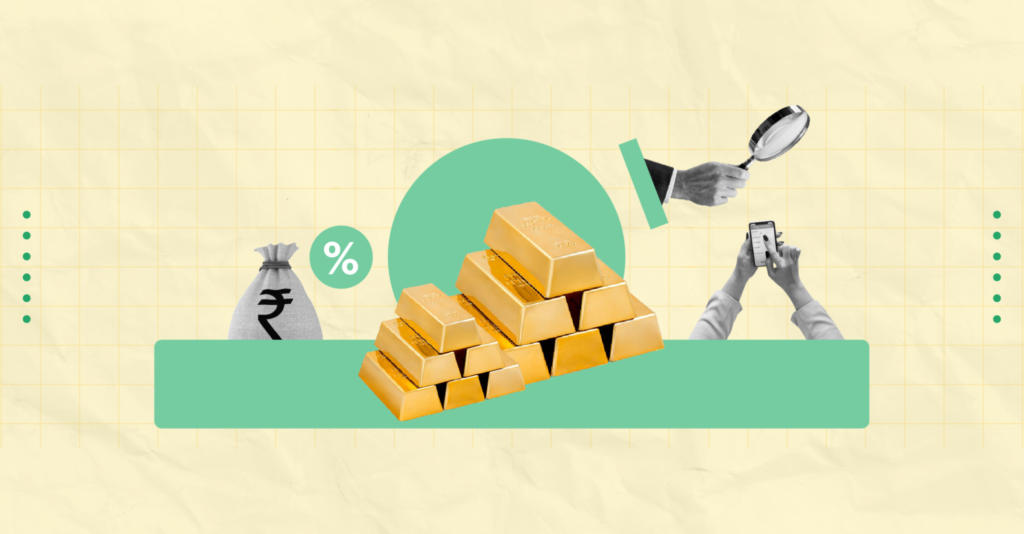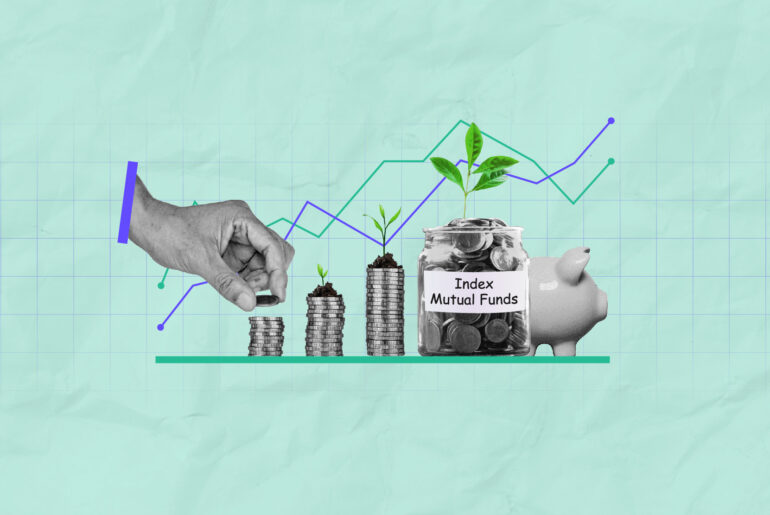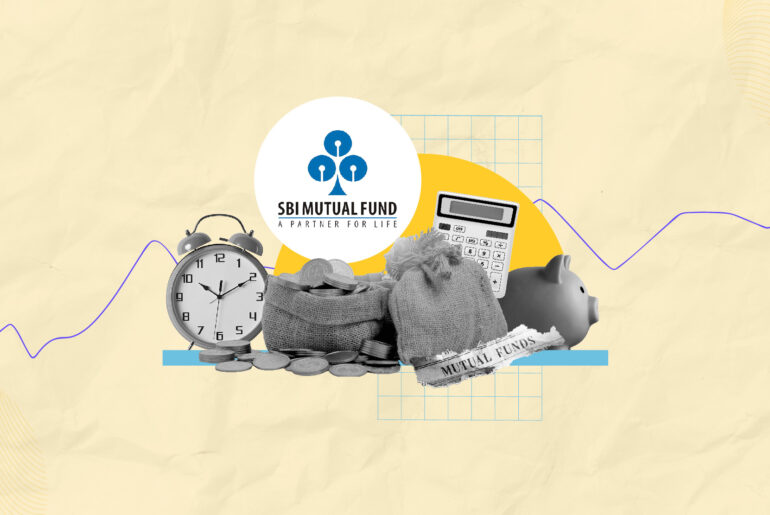Last Updated on Apr 15, 2024 by Harshit Singh
Gold as an investment has always been favoured by investors in India over equity and debt options. Recent data shows a surge in gold demand, reaching 210.2 tonnes in Q3 of 2023, with gold bars and coins hitting a peak since 2015. Moreover, the World Gold Council reports a 10% rise in gold demand, emphasising India’s affinity for the precious metal, which is at its peak during the festive season. As the investment in gold rises, the introduction of modern gold investment solutions like Digital Gold, Gold ETFs, and Sovereign Gold Bonds (SGBs) are slowly coming into consideration.
But which one is more lucrative for you and flexible enough to complement your investment style. In this article, we have briefly explored these digital gold investment options while emphasising their benefits.
Table of Contents
What is Digital Gold?
Digital gold is a convenient and cost-effective alternative to physical gold. It allows you to buy and sell gold online in fractions, starting from as little as Rs. 10. It offers features like easy liquidity, secure storage, and zero making charges. The digital gold available on platforms like Tickertape is of 24K, thus reducing the chances of fraud. Moreover, it is one of the most popular investment options in the online gold segment.
What are Gold ETFs?
Gold ETFs are Exchange Traded Funds that invest in gold bullion (99.50% pure). An investor can conveniently buy and sell gold with Gold ETFs without possessing gold physically. Just like digital gold, Gold ETFs eliminate the need for storage and making charges associated with physical gold purchases.
What are Sovereign Gold Bonds (SGBs)?
These are government-issued financial instruments available annually for purchase at authorised banks, post offices, brokerage firms, and online platforms. SGBs are a type of digital gold that eliminates several risks associated with physical gold. They also come with hassle-free transferability and traceability.
Digital Gold vs Gold ETF
| Parameters | Digital Gold | Gold ETF |
| Meaning | An alternative to physical gold, each unit is 99.9% 24K pure gold. | Invests in physical gold (99.5% purity) sourced from banks, approved by RBI. |
| Who offers | Offered by digital partners such as Tickertape which partnered with Digital Gold India Pvt. Ltd. (SafeGold brand), and others | Provided by various Asset Management Companies (AMCs) in India. |
| Minimum investment | Rs.10 | Minimum 1 unit, equivalent to .1 gram of gold. |
| Trading | Transacted 24/7. | Only during market hours. |
| Ease of Investment | Requires only a valid phone number. | Requires a demat account. |
| Cost | 3% GST on digital gold transactions. | Includes various expenses such as Demat account opening expenses and transaction charges on purchase and sale. Moreover, expense ratio is charged for the entire holding period. |
| Taxation | Taxed at 20% after three years | Taxed at income tax slab rate (e.g., 30%) regardless of holding period |
| Regulation | Not regulated | Regulated by SEBI |
Digital Gold vs Sovereign Gold Bonds
| Parameters | Digital Gold | Sovereign Gold Bond (SGB) |
| Affordability | Minimum investment is Rs.10. | Minimum investment is 1 gram. |
| Lock-in period | No lock-in period | 5 years |
| Trading | Transacted 24/7. | No redemption before 5 years. |
| Disciplined Investing | Daily/weekly/monthly SIPs available | Not available |
| Tax | Treated like physical gold; tax-free returns for investments under 3 years; 20% LTCG tax beyond 3 years. | Taxed at 20% after three years. No capital gains tax if held for eight years. |
| Cost | 3% GST on digital gold transactions. | Transaction and demat account opening expenses. |
| Regulation | Not regulated | Regulated by RBI |
Digital Gold vs Gold ETF vs Sovereign Gold Bonds
| Parameters | Digital Gold | Gold ETF | Sovereign Gold Bonds (SGBs) |
| Capital Return | Change in gold prices | Potentially lower than return on gold due to allocation to cash and debt | Change in gold prices |
| Income Return | Can lease gold to trusted jewellers, earning an additional 3-4% return | Not applicable | 2.5% interest |
| Investment Allocation | Entire amount invested in 24K gold | Not fully invested in gold; includes cash and debt for liquidity | Linked to gold prices |
| Long-term Capital Gains Tax | Taxed at 20% after three years | Taxed at income tax slab rate (e.g., 30%) regardless of holding period | Taxed at 20% after three years. No capital gains tax if held for eight years. |
| Indexation Benefit | Available, reducing tax on gains by adjusting acquisition cost based on inflation | Not available | Available, reducing tax on gains by adjusting acquisition cost based on inflation |
| Liquidity | Transacted 24/7 | Only during market hours | No redemption before 5 years; Lack of liquidity in secondary market |
| Low Investment Amount | Minimum investment as low as Rs. 10 | Minimum investment of 0.1 gm of gold | Minimum investment of 1 gm of gold |
| Disciplined Investing | Daily/weekly/monthly SIPs available | Few brokers offer SIPs | Not available |
| Ease of Exchange | Easily exchanged for physical gold or converted to jewellery | No direct exchange for physical gold | No direct exchange for physical gold |
| Ease of Investment | Requires only a valid phone number | Requires a demat account | Requires a demat account |
| Cost | 3% GST on purchase | Includes various expenses such as Demat account opening expenses and transaction charges on purchase and sale. Moreover, expense ratio is charged for the entire holding period. | Demat account opening expenses |
| Regulation | Not regulated | Regulated by SEBI | Regulated by RBI |
Benefits of Investing in Digital Gold
- Better Returns: Digital Gold has the potential to generate better returns compared to Gold ETFs, even after considering the 3% GST on Digital Gold purchase.
- Full Gold Investment: The entire amount invested in Digital Gold is allocated to 24K gold, unlike Gold ETFs where the investment may also include cash and debt for liquidity purposes.
- Additional Returns through Leasing: Investors in Digital Gold have the option to lease their gold to trusted jewellers, earning an additional 3-4% return, enhancing the overall returns.
- LTCG Benefit: Investing in digital gold results in 20% tax rate on long-term capital gains after three years, compared to the higher income tax slab rate of around 30% applicable to Gold ETFs.
- Indexation Benefit: Digital Gold investors can benefit from indexation, reducing the tax burden on long-term capital gains, which is not available with Gold ETFs.
- Liquidity: Transactions in Digital Gold can be conducted 24/7, providing greater flexibility compared to Gold ETFs, which can only be transacted during market hours. SGBs, on the other hand, have restrictions on redemption before 5 years.
- Low Minimum Investment: Digital Gold allows investors to start with a minimum investment as low as Rs. 10, making it accessible to a wide range of investors. In contrast, SGBs require a minimum investment of 1 gm of gold, and Gold ETFs require a minimum of 0.1 gm of gold.
- Disciplined Investing through SIPs: Investors can adopt a disciplined approach by starting daily, weekly, or monthly SIPs (Systematic Investment Plans) in Digital Gold, allowing them to accumulate gold over time.
- Ease of Exchange and Investment: Digital Gold can be easily exchanged for physical gold, converted to jewellery, or gifted. The investment process is simple, requiring only a valid phone number, unlike Gold ETFs and SGBs, which require a demat account.
Important Considerations for Digital Gold Investment
- Maximum Limit: Many digital gold platforms impose a maximum investment limit of Rs. 2 lakh for individual investors.
- Regulatory Oversight: Since transactions lack regulation by bodies like RBI or SEBI, investor interests may not be fully safeguarded.
- Delivery and Making Charges: Similar to physical gold, converting digital gold to physical gold will attract charges related to delivery and making.
- Storage Duration: Some platforms may impose a limited storage period (upto 5 years). Investors must decide between taking physical delivery or selling after this period.
How to Invest in Digital Gold on Tickertape?
To buy digital gold on Tickertape, follow the below steps –
- Login to Tickertape using a valid mobile number
- Navigate to the Gold section on the home screen
- Click on ‘Invest now in Digital Gold’
- Set your investment amount along with the investment plan – SIP/lump-sum
Here’s a video showcasing how to invest in digital gold on Tickertape – LINK
Conclusion
In the digital asset era, Digital Gold stands out as a secure investment choice, providing purity, collateral for loans, and eliminating storage concerns associated with physical gold. Despite potential challenges like regulatory gaps and investment limits, its advantages, including better returns, full gold investment, leasing opportunities, liquidity, low minimum investment, disciplined SIP options, indexation benefits, and ease of exchange, makes it a compelling choice. It’s crucial for investors to weigh these benefits against individual goals and risk tolerance before investing in digital gold.
- Best MNC Mutual Funds in India (2025) - Apr 23, 2025
- Best Multi Cap Funds in India (2025): Top Equity SIPs - Apr 15, 2025
- Top Performing Mid Cap Funds in India (2025) - Apr 15, 2025




